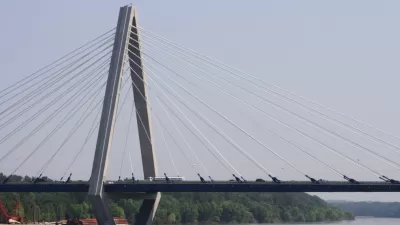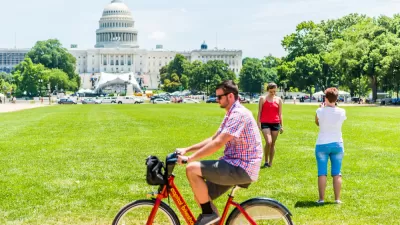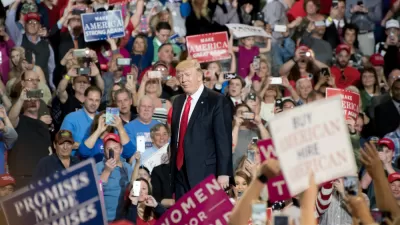President Trump is not the only one proposing a huge infrastructure plan—Senate Democrats have their own. The cost is the same, but financing is different. The Democrats' plan does just what Senate Majority Leader Mitch McConnell warned against.

Senate Democrats support the proposal by President Trump to invest $1 trillion in an infrastructure plan. It's how to pay for it where they differ.
"That is something that congressional Democrats have sought for years, but congressional Republicans have stymied us at every turn," Senate Minority Leader Charles E. Schumer (D-N.Y.) said at a press conference Tuesday, Jan. 24, reports Alexander Bolton for The Hill.
Schumer, however, is not interested in only cutting taxes to help private companies build toll roads. “We will not support tax credits for developers,” he declared.
“That’s not the American tradition; ask Dwight D. Eisenhower,” Schumer said of using tax incentives to promote the creation of toll roads, referring to the nation’s 34th president, who oversaw the creation of the American interstate system.
Of course, if President Eisenhower was alive, he would state that financing the nation's highway system in 1956 was a very contentious issue, although Schumer is correct in that tax incentives weren't used. Instead, after much debate, Congress settled on using gas taxes and user fees to finance the 48,000 mile, toll-free Interstate Highway System.
A one cent per gallon tax was approved, increasing the federal gas tax to three cents per gallon, plus "highway user tax revenue from excise taxes on gasoline, tire rubber, tube rubber, and the sales tax on new trucks, buses, and trailers would be credited to a new Highway Trust Fund and reserved for use on the Interstate System and other highway projects," according to The Rambler, the FHWA's highway history webpage on the federal gas tax.
Trump/Republican plan
Schumer wants the federal government to pay the tab, going against the direction of Senate Majority Leader Mitch McConnell (R-Ky.), who "told reporters last month the level of the national debt 'is dangerous and unacceptable' and pledged to oppose anything resembling the massive infrastructure spending bill President Barack Obama enacted in his first year in office," writes Bolton.
Trump’s campaign recommended “leverag[ing] new revenues” and forming public–private partnerships to incentivize the investments in transportation, clean water, a modern electrical grid and security infrastructure.
Republicans in Congress have embraced the idea of creating tax breaks to spur private infrastructure investment and have warned against any plan that would require massive allocations of federal dollars.
McConnell at [the Jan. 23] meeting at the White House reiterated his view that any package considered by Congress this year needs to be paid for and not add to the deficit.
Polling
A Reuters-Ipsos poll released Jan. 19 shows that Americans prefer a tolling approach to funding the infrastructure plan, with taxes coming in second. A debt-financed approach was least favored. However, when asked only if they would support using tax credits and tolls, and given no alternatives, two-thirds disapproved.
FULL STORY: Dems unveil infrastructure plan, reach out to Trump

Planetizen Federal Action Tracker
A weekly monitor of how Trump’s orders and actions are impacting planners and planning in America.

Maui's Vacation Rental Debate Turns Ugly
Verbal attacks, misinformation campaigns and fistfights plague a high-stakes debate to convert thousands of vacation rentals into long-term housing.

San Francisco Suspends Traffic Calming Amidst Record Deaths
Citing “a challenging fiscal landscape,” the city will cease the program on the heels of 42 traffic deaths, including 24 pedestrians.

Amtrak Rolls Out New Orleans to Alabama “Mardi Gras” Train
The new service will operate morning and evening departures between Mobile and New Orleans.

The Subversive Car-Free Guide to Trump's Great American Road Trip
Car-free ways to access Chicagoland’s best tourist attractions.

San Antonio and Austin are Fusing Into one Massive Megaregion
The region spanning the two central Texas cities is growing fast, posing challenges for local infrastructure and water supplies.
Urban Design for Planners 1: Software Tools
This six-course series explores essential urban design concepts using open source software and equips planners with the tools they need to participate fully in the urban design process.
Planning for Universal Design
Learn the tools for implementing Universal Design in planning regulations.
Heyer Gruel & Associates PA
JM Goldson LLC
Custer County Colorado
City of Camden Redevelopment Agency
City of Astoria
Transportation Research & Education Center (TREC) at Portland State University
Jefferson Parish Government
Camden Redevelopment Agency
City of Claremont





























